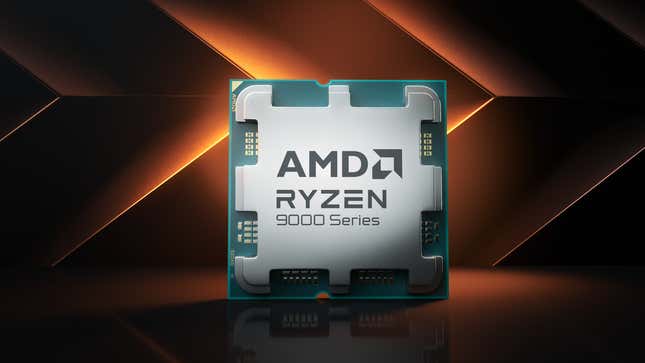ARTICLE AD
This post was updated 6/3/2024 at 8:21 a.m. ET to include more information about OEMs who will sport the new AMD Ryzen AI 300 series chips.
Should You Flip Out for This Samsung Phone? | Gizmodo Review
Just when you thought you had a moment away from any more AI-focused hardware news, AMD is leaping into the “AI PC” arena with its latest mobile laptop chips. The new Ryzen AI 300 series boasts better performance than either Intel or Qualcomm, plus neural processing capabilities.
The chips industry has always been a game of one-upmanship. Now more than ever, chipmakers are trying more than ever to compare their CPUs and GPUs not just on power but on the future promise of ultimate PC performance thanks to the proliferation of AI. AMD doesn’t have to fight against its longtime rival Intel for the consumer-end PC market, but Qualcomm, mainly thanks to the ARM-based Snapdragon X Elite and X Plus in the latest Copilot+ PCs.
AMD is mainly focused on hyping up its two new chip series. One is the new version of its Ryzen CPUs with the Ryzen 9000 series, and the other is the Ryzen AI 300 series stuffed with a new NPU in the form of XDNA 2. On laptops, the two chips will be the Ryzen AI 9 365 and the beefier Ryzen AI 9 HX 370. It’s technically the company’s third-gen AI-centric CPU, but this latest series is differentiated by its massive upgrade in neural processing.
Microsoft says it needs NPUs with at least 40 TOPS to mark them for Copilot+ PCs. Like the recent Snapdragon chips, the HX 370 and the 365 have the same NPU running at 50 TOPS. It’s one of the bigger boasts of AI performance from this past year, but despite the company’s claim it’s there to run more complex AI models, we still have to see if there will be any software worth these new neural components.
The 370 comes with 12 cores, 24 threads, and a 5.1 GHz max boost speed, while the 365 sits at ten cores, 20 threads, and 5.0 GHz max speed. The chips also have the RDNA 3.5 built-in GPU for some mobile graphics work or gaming. During the Taiwan Computex conference, several big OEMs promoted their first PCs that will sport the AI 300 chips. This includes Acer with its Swift series of laptops that are slated for later this year. That company had previously revealed a Swift 14 with a Snapdragon X chip and logos that glow when you’re using the NPU. Asus is also coming out the gate with AMD-powered Zenbook S 16 as well as the ProArt P16 laptop and the ProArt PX13 2-in-1.
What is Zen 5?
These new chips sport the new centralized architecture from AMD, namely Zen 5, on the CPU end. The chipmaker claimed Zen 5 is a big update compared to Zen 4, which is supposed to handle twice the bandwidth of the last generation. What does this mean for PCs? AMD promises you’ll see up to 19% better benchmark performance in Geekbench 6 or 13% better in 3DMark’s physics tests, but that will depend on your PC’s exact chip and other architecture.
Zen 5 is different from the XDNA 2 NPU architecture. You can break up the TOPS speed in the NPU into a whole bunch of other categories, but AMD claims XDNA 2 is two times as power efficient and many times the total neural computing capacity of the previous gen’s 10 or 16 TOPS.
AMD’s New Gaming CPUs Boast Better Performance Thanks to Zen 5 Architecture

Image: AMD
For those who could not care less about the productivity machines centering on the AI 300 chips, all you want to know is how the Ryzen 9000 series stacks up compared to the last generation and Intel’s latest. That includes the Ryzen 5 9600X, Ryzen 7 9700X, Ryzen 9 9900X, and at the tippy top end is the Ryzen 9 9950X. Most boast slightly higher clock speeds, but several, like the 9900x and 9700X, are far more power efficient with better TDP.
To pick on the big boy, that 9950X has 16 cores, 32 threads, and up to 5.7 GHz clock speeds. That’s technically the same specs as the Ryzen 9 7950X3D from the last gen. AMD is trying to hit Intel’s Core i9-14900K by claiming you’ll see marginally better framerates in games like Cyberpunk 2077 or F1 2023 and far better bandwidth for multitasking thanks to the new Zen 5 architecture.
All those gaming-centric CPUs should be arriving in July this year. There’s good news for anybody with the motherboard supporting the AM5 socket. AMD promises to support AM5 through 2027, so if you’re considering upgrading, you’ll have a chance in the next few years. After over eight years of running, AMD plans to end support for AM4 sometime in or after 2025. Zen 5 will continue to be specific to AM5.
The chipmaker said pricing is not set for the series 9000 chips, but we should know more closer to release in July.

 5 months ago
54
5 months ago
54 

